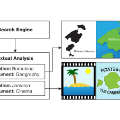Fusing multiple modalities has proven effective for multimodal information processing. However, the incongruity between modalities poses a challenge for multimodal fusion, especially in affect recognition. In this study, we first analyze how the salient affective information in one modality can be affected by the other, and demonstrate that inter-modal incongruity exists latently in crossmodal attention. Based on this finding, we propose the Hierarchical Crossmodal Transformer with Dynamic Modality Gating (HCT-DMG), a lightweight incongruity-aware model, which dynamically chooses the primary modality in each training batch and reduces fusion times by leveraging the learned hierarchy in the latent space to alleviate incongruity. The experimental evaluation on five benchmark datasets: CMU-MOSI, CMU-MOSEI, and IEMOCAP (sentiment and emotion), where incongruity implicitly lies in hard samples, as well as UR-FUNNY (humour) and MUStaRD (sarcasm), where incongruity is common, verifies the efficacy of our approach, showing that HCT-DMG: 1) outperforms previous multimodal models with a reduced size of approximately 0.8M parameters; 2) recognizes hard samples where incongruity makes affect recognition difficult; 3) mitigates the incongruity at the latent level in crossmodal attention.
翻译:暂无翻译



